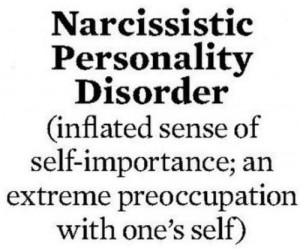Sometime ago, I posted an article on Narcissistic Personality Disorder (NPD) on my mentoring and coaching website I got a lot of comments on my article, and Google seemed to find it interesting enough to give it some pretty high ranking – #2 in search results for about 6 months until the meta tags were inadvertently changed by a new IT staff member. It’s a messy disorder for someone to have and wreaks havoc on the relationships in their life. Helping someone get free of NPD is not an easy road. Most often those who hope for success for a friend or loved one to come out of it are met with disappointment.
Recently, I posted that article to Facebook and got a comment on it that was more an appeal for help from a guy who had a girlfriend who apparently suffers from NPD. I did not anticipate that I would write such a long response to him about it, but it ended up that way. Here is his comment and his question, and my response. I thought it might be helpful to someone who might also know of someone suffering from this relationship disabling disorder.
 Comment/Question: My girlfriend suffers from this disorder, yet she doesn’t realize it nor does she think she has this problem. She is the textbook version of it, so my question is, “how do you convince someone to seek help for this considering a NPD person thinks they are wayyyyyyyyyyy above needing help to begin with???
Comment/Question: My girlfriend suffers from this disorder, yet she doesn’t realize it nor does she think she has this problem. She is the textbook version of it, so my question is, “how do you convince someone to seek help for this considering a NPD person thinks they are wayyyyyyyyyyy above needing help to begin with???
My Answer: Humanly speaking, this disorder can stem from an array of psychoses ranging from multi-personality disorder, bipolarism (manic depression), intense self-centeredness, and deep insecurities that can be as many as there are symptoms of NPD in someone. Getting someone help for this requires a great deal of patience to help them discover these abnormalities in their life.
This is sometimes best handled by addressing abnormalities in their attitude towards someone or something that triggers a manifestation of their NPD. In my view, NPD is the human view of a spiritual problem. It is an extreme manifestation of one’s self will and self-centered desires IN CONTRAST to that of a surrendered will to the will of God, and a life lived out in humility and love (See 1 Corinthians 13:4-8 for a view of the antithesis of NPD). From a spiritual perspective, pastorally speaking, emotional healing of deep wounds that can go as far back as childhood, and deliverance from the SPIRITUAL influences (spiritual wickedness in high places – See Ephesians 6) is how NPD is best dealt with.
As with all positive change, it requires a person to first recognize that the way they live and relate to others is hurting themselves and their relationships and the root cause of their unhappiness and moodiness. I say unhappiness and moodiness, because I have yet to meet anyone that suffers from NPD that is truly happy with themselves or their relationships, and who does not deal with moodiness on a regular basis.
I am not a physician or a licensed psychiatrist, nor do I pretend to have all the answers, but I do understand Biblical and Spiritual principles well enough to know what can be done from a spiritual standpoint. Most psychoses have their origins in the spiritual realm, i.e. “For we are not fighting against flesh-and-blood enemies, but against evil rulers and authorities of the unseen world, against mighty powers in this dark world, and against evil spirits in the heavenly places (Ephesians 6:12 NLT). This sort of approach is for another article (or course of study), but practically speaking, if you are in a relationship with someone like this and NOT married to them, I suggest that you make sure they understand what you perceive in them, and if they are unwilling to seek help through counseling and you are suffering under the oppression of this “disorder” by staying in relationship with them, UNTANGLE yourself from the relationship with them as quickly as possible. I would suggest also distancing yourself from them for whatever length of time it takes for them to recognize and address this ‘disorder’.

If you are married to an individual suffering from NPD, seek marital counseling with a counselor that is well-educated in clinical psychology so that they will be able to address these issues head-on. The short version of the spiritual approach is pretty straight forward. It begins with prayer and fasting for the individual, and petitioning God to reveal their ‘unhappiness’ and ’emotional distress’ to them in such a way that they will want to get help and be delivered of the tormenting spirits that cause the manifestations associated with NPD.
ULTIMATELY, it is a matter of a person’s will to want to change. We are all given a free will to make choices in our lives (the very nature of God Himself). If she is not willing to change, no one, not even God can change her. Yes, God CAN allow her to suffer the full consequences of her actions over time until she is at a place where she wants change in her life, but until SHE realizes her need for change, nothing will change. NPD is a not meant to be a part of relationships, and NO relationship can be health and thrive when NPD is a part of it.